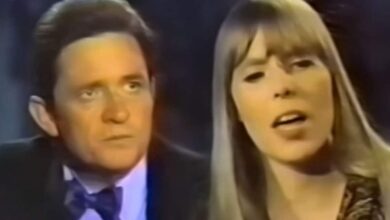Like An Old Lion, His Roar Faded, Yet He Remained A Lion; Johnny Cash Inspired Respect, Love, Sadness, Admiration
Johnny Cash’s final live performance, held on July 5, 2003, at the Carter Family Fold in Hiltons, Virginia, stands as a deeply emotional and significant moment in music history. Just two months prior to his death, Cash, despite his frail condition and reliance on a wheelchair, delivered a poignant 30-minute set that highlighted both his enduring spirit and the profound impact of his music. This performance was not just a showcase of his career but a testament to his resilience and dedication to his art.
The setlist for this final performance was a carefully curated selection of Cash’s most iconic songs, each resonating with the weight of his extensive career and personal experiences. Among the classics performed were “Folsom Prison Blues,” “I Walk the Line,” “Sunday Mornin’ Comin’ Down,” “Ring of Fire,” “Angel Band,” “Big River,” and “Understand Your Man.” Each song was imbued with a sense of finality and reflection, particularly poignant given that Cash had recently lost his beloved wife, June Carter Cash, who had passed away just two months earlier.
The emotional depth of the performance was especially evident in Cash’s dedication of “Ring of Fire” to June. In his remarks, Cash spoke of how June’s spirit was with him that night, offering him both courage and inspiration. This dedication added a layer of personal significance to the performance, reflecting the profound influence June had on both Cash’s personal life and his musical career.
Despite Cash’s physical frailty, his voice, though shaky, still carried the rich, resonant quality that had defined his music for decades. The accompaniment by guitarist Jerry Hensley and bassist Bobby Starnes provided a fitting musical backdrop, enhancing the intimacy and emotional impact of the concert. The audience, fully aware of the historical and emotional significance of the moment, contributed to the deeply reflective atmosphere.
This final concert was more than just a musical event; it was a testament to Cash’s unwavering passion for music and his profound connection with his fans. His ability to convey deep emotion and his commitment to his craft, even in the face of physical decline, were vividly displayed throughout the performance. The concert was a poignant conclusion to a remarkable career, highlighting his resilience and the enduring power of his artistry.
Johnny Cash’s influence on country music is profound and enduring. Known for his distinctive deep voice and rebellious persona, Cash left an indelible mark on the genre. Hits like “I Walk the Line,” “Folsom Prison Blues,” and “Ring of Fire” not only defined his career but also helped shape the landscape of country music. His legacy extends beyond his music, as his life and career reflected a deep connection to his roots and a dedication to storytelling through song.
Born J.R. Cash on February 26, 1932, in Kingsland, Arkansas, Johnny Cash’s rise to fame began in the 1950s with a series of groundbreaking recordings that combined country, rockabilly, and gospel influences. His distinctive voice and straightforward, often raw lyrics captured the struggles and triumphs of everyday life, resonating with a broad audience and earning him a lasting place in the annals of music history.
Cash’s career was marked by both triumphs and challenges, including struggles with addiction and personal hardships. Yet, his ability to channel these experiences into his music only deepened the impact of his work. Throughout his life, Cash remained a figure of authenticity and resilience, qualities that were evident in his final performance and continue to be celebrated by fans and musicians alike. His legacy endures through his extensive catalog of music and the profound influence he had on the evolution of country music and beyond.





